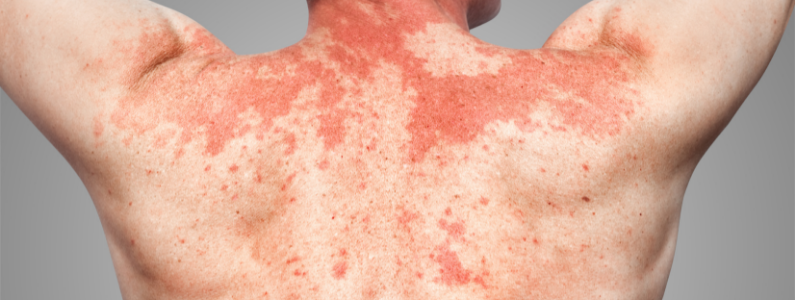![]()
![]() Skin allergies can take place when the immune system reacts to a foreign substance – such as pet dander, bee venom, and pollen – or a food that does not cause a reaction in the majority of people. According to the specialists for skin allergy treatment in Zirakpur, substances known as antibodies are produced by the immune system. When you have allergies, the antibodies are created by the immune system that recognizes a specific allergen as harmful, even though it is not.
Skin allergies can take place when the immune system reacts to a foreign substance – such as pet dander, bee venom, and pollen – or a food that does not cause a reaction in the majority of people. According to the specialists for skin allergy treatment in Zirakpur, substances known as antibodies are produced by the immune system. When you have allergies, the antibodies are created by the immune system that recognizes a specific allergen as harmful, even though it is not.
When you come in contact with the allergen, the reaction of the immune system can exacerbate the skin, digestive system, airways, or sinuses. The severity of allergies differs from individual to individual and can range from slight irritation to anaphylaxis – a potentially life-threatening emergency. At the same time as the majority of allergies can’t be cured, treatments can help relieve the symptoms of allergies.
There is a wide variety of causes that might contribute to irritated skin. Immune system diseases, drugs, and infections are just a few instances of what you can go through. An allergic skin condition is one in which an allergen is the result of the reaction of the immune system. Normally, harmless materials such as plants, soap, pollen, or wool may result in a skin allergy. When this trigger is discovered, the immune system goes after it to get rid of it.
The outcome is a rash on the skin that is itchy and red. Hives, contact dermatitis, and atopic dermatitis are all several different kinds of skin allergies.
Symptoms
An allergic skin response is a blistered, red, or itchy skin. The following are some of the key symptoms that may be available – redness, a raised bump, itching, or a blend of the three.
The symptoms of skin allergy, which depend on the matter involved, can have an effect in the digestive system, skin, nasal passages, sinuses, and airways. Allergic reactions can vary from mild to severe. In a few severe scenarios, allergies can trigger a life-threatening reaction known as anaphylaxis.
Atopic dermatitis is a type of allergic skin condition, which is also known as eczema. It can result in the skin:
- Peel or flake
- Redden
- Itch
A drug allergy can result in:
- Anaphylaxis
- Wheezing
- Fascial swelling
- Rash
- Itchy skin
- Hives
An insect sting allergy can result in:
- Anaphylaxis
- Shortness of breath, wheezing, chest tightness, or cough
- Hives or itching all over the body
- A large area of swelling (edema) at the sting spot
A food allergy can result in:
- Anaphylaxis
- Hives
- Swelling of the throat, face, tongue, or lips
- Tingling in the mouth
Hay fever, which is also known as allergic rhinitis, can result in:
- Swollen, red, or watery eyes (conjunctivitis)
- Runny, stuffy nose
- Itching of the nose, eyes, or roof of the mouth
- Sneezing
The patterns and symptoms may be used to recognize different types of skin allergies. In the fullness of time, the reactions of an individual might alter. A 2nd exposure to the trigger may lead to completely different symptoms from the 1st.
Anaphylaxis
A few types of allergies, including allergies to insect stings and food, can trigger a severe reaction, which is known as anaphylaxis. In a life-threatening medical emergency, anaphylaxis can lead you to go to into shock. The following are some of the signs and symptoms of anaphylaxis:
- Nausea and vomiting
- A rapid, weak pulse
- Lightheadedness
- Skin rash
- Severe shortness of breath
- A drop in blood pressure
- Loss of consciousness
Causes of Skin Allergies
With more than 3,000 different types of allergies existing across the globe, it comes out to be extremely difficult to recognize the actual culprit. Due to this reason, at times, it also comes out to be very difficult to diagnosis and treatment of skin allergy. An allergy begins when the immune system mistakes a normally harmless material that remains on the alert for that specific allergen. When you are exposed to the allergen, such antibodies can release a lot of immune system chemicals, such as histamine, that result in the symptoms of allergy.
The following are some of the most common triggers for allergy:
- Latest or other substances you touch, which can result in allergic skin reactions
- Medications, specifically penicillin or antibiotics that are based on penicillin
- Insect stings, such as wasps or bee
- Certain foods, especially milk, eggs, shellfish, fish, soy, wheat, tree nuts, and peanuts
- Airborne allergens, such as mold, dust mites, animal dander, and pollen
Scents
Lotions, perfumes, and other aroma-enhancing substances are among the most common triggers for allergy. Ingredients that are found in everyday home goods and supplies, and metals and preservatives that are found in common household items might irritate your skin.
- Antiperspirants
- Cosmetics
- Sunscreens
- Cleaners
Skin creams containing antibiotics, and a lot of over-the-counter options consisting of neomycin and bacitracin can cause allergic reactions to the skin. In addition, natural rubber or latex is used in a wide variety of things such as:
- Feeding bottles
- Gloves that were thrown away
- Balloons
- Condoms
Treatment for Skin Allergy
Keeping away from allergens, making use of preventative treatments such as anti-histamines, and controlling symptoms are some of the most promising ways to deal with skin allergies. The majority of the scenarios of eczema and contact dermatitis are not life-threatening. Topical corticosteroids and skin allergy medicine usually treat skin allergies for the reason that they decrease inflammation and irritation. You can also mull over taking skin allergy home remedies as well.
Prevention is the most promising approach. Stumble on what results in the rash and keep away from it. You may need to wear gloves in order to protect the skin. When you have a reaction, make an effort to ease the symptoms and avert an infection. Do not scratch, even though that is a hard urge to resist. Over-the-counter products and home remedies can help in the treatment of skin allergy and help relieve itching and stop swelling.
You can even try:
- Oatmeal baths
- Cold compresses
- Antihistamines
- Ointments such as calamine lotion
- Hydrocortisone cream
Or else, it is always a good idea to have a word with a professional and experienced doctor at Renovin Skin, Hair and Laser Clinic, Zirakpur. One will suggest to you what will work wonders for a specific rash. In addition, one can even prescribe stronger medicines if needed, as well!



